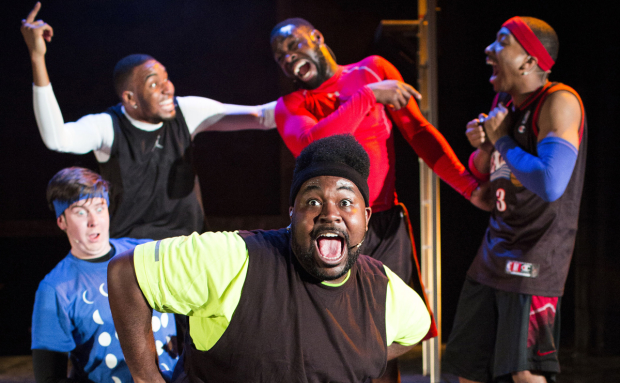The Spalding Suite (Tour)

© Helen Maybanks
Basketball’s not my sport – I’m 5’7" on a good day – but The Spalding Suite manages to make its appeal clear even to the untrained eye. A mash-up of physical theatre, beatboxing and spoken word, it becomes an appreciation of the sport, as much for its aesthetics as its athletics.
Director Benji Reid turns the sport’s movement into explosive physical theatre, filled with Matrix-style slow mos and nifty ball juggling. When the ball is mimed, its bounces, slaps and swishes are soundtracked by the quickfire beatboxing of MC Zani; a characterful addition that adds punctuation and humour. Around this Inua Ellams and five other poets provide a cloud of words that jump off into metaphor or fixate on the extraordinary bodies of players: the "amalgamation of stolen limbs" needed to make a sporting superstar.
It’s a mark of how mixed British theatre has become that three forms once deemed alternative can combine to make quite a mainstream show. There’s an accessibility about The Spalding Suite. It takes a subject with a wide appeal and subjects it to consideration. Reid and Ellams borrow from the sporting display show – Harlem Superstar-style – yet emphasises the art involved, not just the skill.
There’s a loose narrative, of sorts; about a five-strong street team, each with their different strengths and weakness – one’s too slow, another too vain – and, at first, they find themselves embarrassed by opponents. In time, they learn hard work and teamwork, how they compliment one another as a group. Mostly, though, it’s a think-piece and the assorted poems dwell on the science, the tactility and the social politics of the sport. You can get lost in that jumble though, and often impressive actions speak louder than considered words.
However, these bodies are poetry in their own right. They spring like jack-in-the-boxes, pressed down low, then stretching ten foot in the air. Limbs pump like pistons. Feet shuffle like a pro croupier; sneakers squeaking on the floor. When they jump, they fix shapes in the air and, for a split-second, these young men hang like paintings, momentarily defying gravity.
That’s the image that recurs throughout. They talk of wings and flight – or, in other words, of escape. These five young men on a basketball court in New Cross, one of London’s most deprived areas, four of them black, can find some freedom in this sport. They surpass their situation, become like gods for an afternoon. One of the poems invokes Prometheus, the Titan who gave man fire, as if by balling these men can stretch towards superhumanity.
The best poem comes at the end: a longing look back at lost youth from the aches and pains of middle-age. It’s an ode to youthful bodies and the things they used to do. Ex-pros are "6’6" of repetitive muscle injury," it says. They wear their limps and niggles with pride, left to summon past glories in their mind’s eye. "Gravity came calling – to shackle our ankles and dreams," the piece ends. "But for a time, we were free."
The Spalding Suite runs at the Southbank Centre until May 2nd, then tours nationwide. Full details here.










